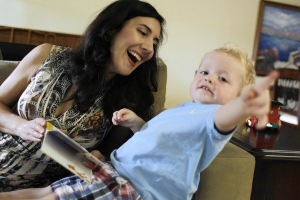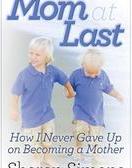Institute in Nebraska offers alternative to popular IVF treatments
By Manya A. Brachear, Chicago Tribune reporter
Mary-Louise Hengesbaugh admits to growing bitter as she counseled women who considered having abortions to end their unwanted pregnancies five years ago.
Pregnancy was all she wanted.

But as the director of the Chicago Archdiocese’s Respect Life office, she couldn’t share her struggle with infertility, which lasted for more than nine years.
“I thought, ‘Is God laughing at me?’” she said.” I had a real chip on my shoulder.”
Unable to conceive and unwilling to try in vitro fertilization, she and her husband, Brian, adopted their son, Ben, in 2010. She quit her job to be a stay-at-home mom.
But earlier this year, after treatment at the Pope Paul VI Institute in Omaha, Neb., Mary-Louise and Brian Hengesbaugh conceived naturally. Their second child is expected to arrive in December.
“Being a serious Catholic, I do not believe in IVF or (artificial insemination),” said Hengesbaugh, 37, of Chicago’s Lincoln Park neighborhood. “What a joy to remain true to God’s plan and experience this miracle.”
While Chicago has become one of the nation’s hubs for advanced reproductive technology such as IVF, Omaha has become a hub for alternative fertility care. Pope Paul VI is one of a handful of clinics across the nation that offers natural procreative technology, which is a church-sanctioned medical and surgical intervention to supplement the Creighton Model FertilityCare System.
That model encourages women to take a more collaborative approach to their fertility care by watching for biological signs of a higher potential to get pregnant. It replaces what’s commonly referred to as “the rhythm method” that’s based on a woman’s cycle.
Proponents say the alternative paradigm focuses on treating conditions of which infertility is a symptom, rather than treating infertility as the disease. They say it also doesn’t force couples to confront ethical crossroads they never expected.
Teresa Kenney, a women’s healthnurse practitioner at the institute in Omaha, said many women come to the clinic with conditions that a surgeon can remedy, making conception possible. But before they reach Omaha, she said, many have already been prescribed contraceptives to suppress symptoms and “reboot” their reproductive system. Or, she said, they have been told IVF is the best option.
“With the method we use, we don’t have to go down any road that compromises people’s values in this area that as Christians we think is so important: the dignity and sacredness of human life,” Kenney said. “It gives women a lot of peace in knowing what’s wrong with them. We’re actually going to give them answers about why they’re not conceiving and give them a much better success rate and outcome.”
Hengesbaugh sought the services of the Pope Paul VI Institute in 2006. A doctor removed endometriosis and partial blockage in a fallopian tube. In 2007, she suffered a miscarriage from an ectopic pregnancy, which also ruptured one of her fallopian tubes. The incident scared her too much to try again, and the couple adopted in 2010.
Read More on this Amazing Conception Story

